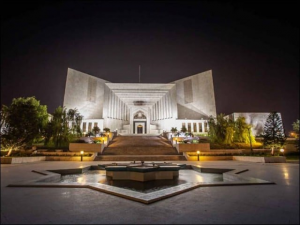The CJP rips apart the review process
A prominent jurist expresses doubts about the legitimacy of a new statute

A number of flaws in the Supreme Court (Review of Judgments and Orders) Act 2023 were brought to light on Tuesday by Pakistan’s Chief Justice Umar Ata Bandial in ISLAMABAD.
He pointed out that with this law, a “super appeal” had been established.
The Chief Justice of Pakistan asked PTI lawyer Ali Zafar, “Don’t you think they should have made this law carefully rather than hastily?”
According to the chief justice, Article-187 of the Constitution may have been implemented by parliament to guarantee full justice in a review jurisdiction.
As an illustration, Justice Bandial cited India, where a review jurisdiction was expanded on two reasons.
The Chief Justice pointed out that the legislature had effectively established an appeals court under this provision.
Cases under the Review of Judgments Act and the Punjab Elections Revision Act were being heard by a three-member special bench of the Supreme Court presided over by the CJP.
The Supreme Court made it clear that the petitions challenging the Review of Judgments Act would be heard first, followed by the case to revise the results of the Punjab election.
After hearing arguments from the lawyer for the Election Commission of Pakistan (ECP), the court agreed to postpone ruling on the Punjab elections issue until it resolved the Review of Judgments Act.
The Chief Justice stated that the Court could not delay another statute because it had already delayed one.
While arguing on behalf of the petitioner, the attorney requested a hearing before a bigger bench of eight judges and requested that the Review of Judgments Act be temporarily suspended.
The judges kept cracking jokes at the lawyer’s argument.
The lawyer went on to say that there were many parallels between the SC (Practice and Procedure) Act and the Review of Judgments Act.
The Chief Justice requested him to break down the similarities between the two statutes.
The attorney responded that Article 10-A was violated and the independence of the judiciary was compromised by the Review of Judgments Act.
He continued by saying that the goal, which the Practice and Procedure Act had failed to accomplish, was now being pursued through the Review of Judgments Act.
Both statutes, Justice Munib Akhtar clarified, pertained to different territories.
Zafar, from PTI, asked to be added as a party during the hearing.
The court granted his motion without delay and heard his reasons.
Zafar contended that the SC has jurisdiction to review previous rulings.
He further mentioned that the Supreme Court’s rulings were presumed to be final and that the court would not reexamine the evidence in the event of a retrial.
The PTI attorney insisted that only a hearing could determine whether or not a change was warranted.
He went on to say that an appeal couldn’t fall within the same jurisdiction as a revision.
Justice Akhtar questioned him to ensure that the Act had not altered the review process.
According to Zafar, a revision now has the same authority as an appeal thanks to the new Act.
Zafar was questioned by Justice Akhtar on the implications of a rule change before the entire court the next day.
The PTI attorney responded that even the rules wouldn’t trump the Constitution.
He then speculated that the legislation of a second appeal might be enacted the day after tomorrow if such laws were to be made in the future.
Zafar proceeded by saying that the SC’s rulings would not be final if the right to multiple appeals was granted.
Both cases have been postponed until this coming Wednesday.









































